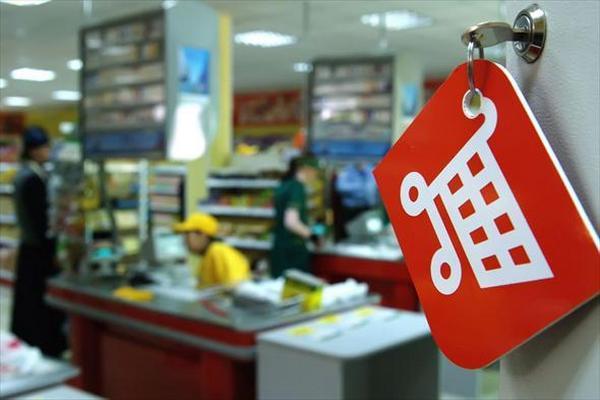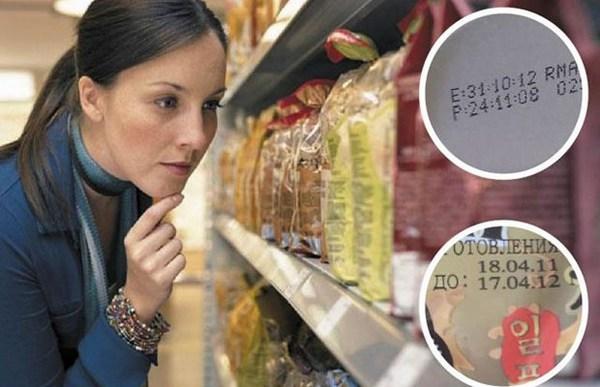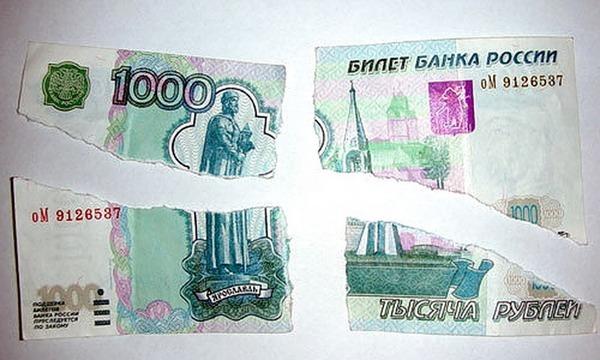599
8 rules of conduct in the stores, which will help avoid any unpleasant incidents
"Law on Protection of Consumer Rights" is always on your side, but it must be able to handle. To make life easier for our readers, and to protect it from unpleasant incidents during shopping, Website provides a useful compilation of rules of conduct in the stores.
Do I need to take personal belongings in a locker?
Photo source: Pikabu.ruPrakticheski in all major stores installed at the entrance of the cell, where visitors can put their packs and bags. Previously were frequent occasions when guards blocked the way to customers with hand luggage. Now this does not happen often.
Nevertheless, it is necessary to bear in mind that, under Article 421 of the Civil Code to take things in a locker - is voluntary Therefore, the requirements of the guards are illegal.. In addition, under Article 426 of the Civil Code of the Russian Federation by virtue of a public contract of retail purchase and sales outlet employees have no right to deny the visitor to enter the room and to make purchases in connection with the presence of the package, bag or backpack.
At the same time, if you agreed to leave things in the cell, remember - store administration is fully responsible for their safety Even in the case when the storage chambers themselves point back information.. This rule is provided in Article 901 of the Civil Code.
Who should pay if you accidentally break something?
It happens that the buyer, in the narrow aisles of a trading hall, accidentally touches the shelf and drops the bottle or jar with conservation. In such situations, the sellers often require users to pay for damaged goods.
However, do not fall for the "persuasion". According to article 401 of the Civil Code a citizen is responsible for damaged or lost items only if there is guilt. That is, store administration must prove that there was malice in your actions, and you especially damaged goods. If we are talking about unintentional damage to things, according to Article 211 of the Civil Code all the risks lie on its owner. In accordance with Article 459 of the Civil Code, while the money for the goods is not transferred to the seller, the owner of a shop. The buyer becomes the owner only after payment.
In this regard, if the store employees are asked to pay for the broken bottle or can, refer to the circumstances that suggest that there is no fault of your own. For example, slippery floors, bad enshrined goods on the shelves, narrow corridors, staggering racks and so on. If the personnel point of sale does not agree with your arguments, ask the store to go to court. Sellers can expect to pay for damaged goods on the site, only if you acknowledge their guilt and are willing to pay.
What are your actions, if you saw the expired goods on the shelf?
For example, on the counter point of sale you notice items with expired shelf life. Be sure to tell the staff shop. Sellers are required to remove the delay in the presence of the buyer. The presence of such goods and the actions of employees of the outlet is written in the book of complaints and suggestions. Its definitely check Rospotrebnadzor inspectors during the audit store. You can also take a photo of the goods with expired shelf life and yourself to complain to the agency.
It should be noted, in accordance with Article 14.4 of the Administrative Code for trafficking delay punishable by an administrative fine for officials - from 3 000 to 10 000 rubles; for persons engaged in entrepreneurial activities without forming a legal entity - from 10 000 to 20 000 rubles; for legal entities -. from 20 000 to 30 000 thousand rubles
What if the value of the goods at the box office is different from the specified on the price list? I'm sure many have faced with a situation where at the box office it appears that the product is more expensive than indicated on the price list. Store employees are coming up with a variety of explanations. However, you have the right to request to release the goods for the value that you saw on the price list. This is a public offer, not subject to change.
In addition, in accordance with Articles 10 and 12 of the RF Law "On Protection of Consumer Rights" the seller is obliged to provide reliable information about the value of the goods - in this case, the price tag is a means of informing. In case of discrepancy the buyer has the right to complain to the Federal Service for the involvement of the administration of the outlet to the liability under Article 14.8 of the Administrative Code.
Your actions when the checkout no change?
The situation where the seller refuses to serve you because of the lack of delivery, are not uncommon. Sometimes the cashier asks the customer to exchange large bills on their own and come back later to pay for the goods. In this case, the store employee operates illegally.
According to the rules of operation of cash registers in the implementation of monetary settlements with the population, approved by the Ministry of Finance of the Russian Federation August 30, 1993 № 104, the obligation to ensure a sufficient number of cashiers fine money lays on the outlet guide. It is store manager (and not cashier and, especially, the buyer) should be sent for by exchanging.
In addition, in accordance with Article 426 of the Civil Code, the seller has no right to refuse to enter into a public contract of sale if it is possible to sell a product or provide a service. Lack of delivery is not a sufficient reason for refusing to make a deal.
The legislation gives the buyer the right in court to achieve the conclusion of a public contract. Naturally, due to the lack of small money to file a claim no one will not. But you can threaten the cashier account in the book of complaints and suggestions. As a rule, it acts on the employees of large retail outlets. Small bills and coins immediately find in neighboring offices or at the accountant.
What if the cashier refuses to take a torn banknote?
In a situation where the seller refuses to accept the calculation of the dirty, torn or crumpled bill, contact the Bank of Russia Instruction dated December 26, 2006 N 1778-U. This document governs the determination of the solvency of banknotes. Thus, in the instructions it states that to the cash flow received bills with the following defects: dirty, worn, torn, frayed, punctured, pierced, written, as well as bills, lost corners and edges, with spots and traces foreign stamps. Coins may be small mechanical damage.
In the case of more severe defects can not pay a bill. However, the bank has the opportunity to exchange the damaged bill on the new one. Unless, of course, has no signs of forgery.
< The Bank will take the bill for exchange if it has retained at least 55% of the area, even if it is part of the bonded pieces. Of course, all the pieces must belong to the same bill. In addition, the exchange is subject to a bank card, consisting of two fragments different bills of the same denomination. The main thing is that each part takes at least 50% of the initial area.
Damaged coin (eg, flattened) can also be exchanged at the bank, the main thing that it has retained 75% of the original mass.
Can guards merchant customers implement a search? In this respect the law expressly says - the guards have no authority to search the customer If squeaked frame output, or any other suspected stolen goods, the security shall be entitled to offer you willingly show their stuff or cause. police. In this case, the choice of the buyer. However, recall that the personal searches made by police officers in the presence of two clear of the same sex as the searched. According to Article 27.7 of the Administrative Code of the RF procedure is logged.
Who will pay for the treatment in case of injury at the store? store management must create a safe environment for shopping. If a visitor is injured at the point of sale, according to article 1064 of the Civil Code, he has the right submit a lawsuit for damages. However, in this case, will have to prove the fact of the damage was in the store, as well as that it is related to the acts or omissions of the representatives of commercial enterprises.
However, in judicial practice, there are many precedents, when it was resolved in favor of the buyer. However, this is not always a quick process. Thus, a resident of Krasnoyarsk Territory took nearly a year to seize over 200 thousand for the resulting compound fracture. She broke her foot slipped on the porch of a grocery store shopping.
In Bashkortostan, a woman and a half years of construction supermarket bowled at 15 thousand rubles for a concussion, received from the head fell to the roll of thermal insulation materials.
The buyer always has a chance to prove their case and get compensation for the resulting damage and costs and non-pecuniary damage.
< Website wishes you good shopping!
via pikabu.ru/story/polezno_ne_tolko_sevastopoltsam_vosem_pravil_kotoryie_nuzhno_znat_pri_poseshchenii_magazinov_foto_4359947
Do I need to take personal belongings in a locker?

Photo source: Pikabu.ruPrakticheski in all major stores installed at the entrance of the cell, where visitors can put their packs and bags. Previously were frequent occasions when guards blocked the way to customers with hand luggage. Now this does not happen often.
Nevertheless, it is necessary to bear in mind that, under Article 421 of the Civil Code to take things in a locker - is voluntary Therefore, the requirements of the guards are illegal.. In addition, under Article 426 of the Civil Code of the Russian Federation by virtue of a public contract of retail purchase and sales outlet employees have no right to deny the visitor to enter the room and to make purchases in connection with the presence of the package, bag or backpack.
At the same time, if you agreed to leave things in the cell, remember - store administration is fully responsible for their safety Even in the case when the storage chambers themselves point back information.. This rule is provided in Article 901 of the Civil Code.
Who should pay if you accidentally break something?

It happens that the buyer, in the narrow aisles of a trading hall, accidentally touches the shelf and drops the bottle or jar with conservation. In such situations, the sellers often require users to pay for damaged goods.
However, do not fall for the "persuasion". According to article 401 of the Civil Code a citizen is responsible for damaged or lost items only if there is guilt. That is, store administration must prove that there was malice in your actions, and you especially damaged goods. If we are talking about unintentional damage to things, according to Article 211 of the Civil Code all the risks lie on its owner. In accordance with Article 459 of the Civil Code, while the money for the goods is not transferred to the seller, the owner of a shop. The buyer becomes the owner only after payment.
In this regard, if the store employees are asked to pay for the broken bottle or can, refer to the circumstances that suggest that there is no fault of your own. For example, slippery floors, bad enshrined goods on the shelves, narrow corridors, staggering racks and so on. If the personnel point of sale does not agree with your arguments, ask the store to go to court. Sellers can expect to pay for damaged goods on the site, only if you acknowledge their guilt and are willing to pay.
What are your actions, if you saw the expired goods on the shelf?

For example, on the counter point of sale you notice items with expired shelf life. Be sure to tell the staff shop. Sellers are required to remove the delay in the presence of the buyer. The presence of such goods and the actions of employees of the outlet is written in the book of complaints and suggestions. Its definitely check Rospotrebnadzor inspectors during the audit store. You can also take a photo of the goods with expired shelf life and yourself to complain to the agency.
It should be noted, in accordance with Article 14.4 of the Administrative Code for trafficking delay punishable by an administrative fine for officials - from 3 000 to 10 000 rubles; for persons engaged in entrepreneurial activities without forming a legal entity - from 10 000 to 20 000 rubles; for legal entities -. from 20 000 to 30 000 thousand rubles
What if the value of the goods at the box office is different from the specified on the price list? I'm sure many have faced with a situation where at the box office it appears that the product is more expensive than indicated on the price list. Store employees are coming up with a variety of explanations. However, you have the right to request to release the goods for the value that you saw on the price list. This is a public offer, not subject to change.
In addition, in accordance with Articles 10 and 12 of the RF Law "On Protection of Consumer Rights" the seller is obliged to provide reliable information about the value of the goods - in this case, the price tag is a means of informing. In case of discrepancy the buyer has the right to complain to the Federal Service for the involvement of the administration of the outlet to the liability under Article 14.8 of the Administrative Code.
Your actions when the checkout no change?

The situation where the seller refuses to serve you because of the lack of delivery, are not uncommon. Sometimes the cashier asks the customer to exchange large bills on their own and come back later to pay for the goods. In this case, the store employee operates illegally.
According to the rules of operation of cash registers in the implementation of monetary settlements with the population, approved by the Ministry of Finance of the Russian Federation August 30, 1993 № 104, the obligation to ensure a sufficient number of cashiers fine money lays on the outlet guide. It is store manager (and not cashier and, especially, the buyer) should be sent for by exchanging.
In addition, in accordance with Article 426 of the Civil Code, the seller has no right to refuse to enter into a public contract of sale if it is possible to sell a product or provide a service. Lack of delivery is not a sufficient reason for refusing to make a deal.
The legislation gives the buyer the right in court to achieve the conclusion of a public contract. Naturally, due to the lack of small money to file a claim no one will not. But you can threaten the cashier account in the book of complaints and suggestions. As a rule, it acts on the employees of large retail outlets. Small bills and coins immediately find in neighboring offices or at the accountant.
What if the cashier refuses to take a torn banknote?

In a situation where the seller refuses to accept the calculation of the dirty, torn or crumpled bill, contact the Bank of Russia Instruction dated December 26, 2006 N 1778-U. This document governs the determination of the solvency of banknotes. Thus, in the instructions it states that to the cash flow received bills with the following defects: dirty, worn, torn, frayed, punctured, pierced, written, as well as bills, lost corners and edges, with spots and traces foreign stamps. Coins may be small mechanical damage.
In the case of more severe defects can not pay a bill. However, the bank has the opportunity to exchange the damaged bill on the new one. Unless, of course, has no signs of forgery.
< The Bank will take the bill for exchange if it has retained at least 55% of the area, even if it is part of the bonded pieces. Of course, all the pieces must belong to the same bill. In addition, the exchange is subject to a bank card, consisting of two fragments different bills of the same denomination. The main thing is that each part takes at least 50% of the initial area.
Damaged coin (eg, flattened) can also be exchanged at the bank, the main thing that it has retained 75% of the original mass.
Can guards merchant customers implement a search? In this respect the law expressly says - the guards have no authority to search the customer If squeaked frame output, or any other suspected stolen goods, the security shall be entitled to offer you willingly show their stuff or cause. police. In this case, the choice of the buyer. However, recall that the personal searches made by police officers in the presence of two clear of the same sex as the searched. According to Article 27.7 of the Administrative Code of the RF procedure is logged.
Who will pay for the treatment in case of injury at the store? store management must create a safe environment for shopping. If a visitor is injured at the point of sale, according to article 1064 of the Civil Code, he has the right submit a lawsuit for damages. However, in this case, will have to prove the fact of the damage was in the store, as well as that it is related to the acts or omissions of the representatives of commercial enterprises.
However, in judicial practice, there are many precedents, when it was resolved in favor of the buyer. However, this is not always a quick process. Thus, a resident of Krasnoyarsk Territory took nearly a year to seize over 200 thousand for the resulting compound fracture. She broke her foot slipped on the porch of a grocery store shopping.
In Bashkortostan, a woman and a half years of construction supermarket bowled at 15 thousand rubles for a concussion, received from the head fell to the roll of thermal insulation materials.
The buyer always has a chance to prove their case and get compensation for the resulting damage and costs and non-pecuniary damage.
< Website wishes you good shopping!
via pikabu.ru/story/polezno_ne_tolko_sevastopoltsam_vosem_pravil_kotoryie_nuzhno_znat_pri_poseshchenii_magazinov_foto_4359947
Find Badger: Stunning visual puzzle game from BBC
Beautiful and wise parable about why people are shouting at each other























